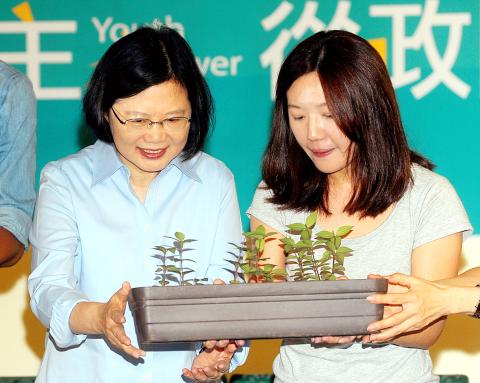The Democratic Progressive Party (DPP) yesterday announced two youth-oriented programs aimed at encouraging the young to participate in politics, which it says is crucial to deepening Taiwan’s democracy and reforming the party.
The first program, Youth Power, encourages people aged 23 to 40 to participate in the November elections for township councilors and borough and village wardens.
The second program, the Youth Council, aims to bring young people together to discuss a wide range of political issues and include those opinions in the DPP’s policymaking process.

Photo: CNA
“The key to launching these programs is to raise public awareness, in particular after the Sunflower movement, that Taiwan’s democracy should be deepened and to see whether the DPP could work with society once again,” DPP Chairperson Tsai Ing-wen (蔡英文) told a press conference yesterday.
Noting that Taiwan’s 38 years of Martial Law ended on the same day 27 years ago — July 15, 1987 — Tsai said that Taiwan’s democratization was a product of the dedication and struggle of many young and fearless politicians who are now senior DPP members.
That is why the DPP has to “reinvest” the resources that society has given the party back to the young people, she said.
Tsai added that political participation does not necessarily mean running in elections, because all forms of activities that improve people’s livelihood and civil society are just as important.
The DPP will provide candidates who pass the preliminary screening with a subsidy of NT$30,000 (US$993) as well as consultation and training in campaign strategy and agenda-setting, the DPP’s Democracy Institute deputy director Wu Pei-yi (吳沛憶) said.
In return, the candidates have to pledge that they will not buy votes and, if elected, work to ensure transparency in all their community works and promote grassroots democracy, Ho said.
The party did not set a goal on how many young candidates it would train and sponsor.
The Youth Council will serve as a longstanding platform for the DPP to exchange ideas with young people, DPP Department of Youth Development director Fu Wei-che (傅偉哲) said.
The first meeting of the council is scheduled to be held in Greater Taichung on July 26, with follow-up meetings in Greater Kaohsiung, Taoyuan County and New Taipei City, among other places, taking place every other Saturday.
Fu said the DPP plans to gather public opinions online before every meeting and present the conclusions and recommendations to the party’s Central Standing Committee — its highest decisionmaking body — for reference and further discussion.
“We are not trying to incorporate or neutralize young people’s voices with the platform. Quite the contrary, our aim is to highlight their voices and make young people the forefront of the DPP,” Fu said.
Fu and Ho, both student movement leaders, were among Tsai’s “prize recruits.” The party leader pledged a youthful movement as part of her party reform when she assumed the two-year DPP chairmanship in May, about one month after the Sunflower movement.

CHANGING LANDSCAPE: Many of the part-time programs for educators were no longer needed, as many teachers obtain a graduate degree before joining the workforce, experts said Taiwanese universities this year canceled 86 programs, Ministry of Education data showed, with educators attributing the closures to the nation’s low birthrate as well as shifting trends. Fifty-three of the shuttered programs were part-time postgraduate degree programs, about 62 percent of the total, the most in the past five years, the data showed. National Taiwan Normal University (NTNU) discontinued the most part-time master’s programs, at 16: chemistry, life science, earth science, physics, fine arts, music, special education, health promotion and health education, educational psychology and counseling, education, design, Chinese as a second language, library and information sciences, mechatronics engineering, history, physical education

DEADLOCK: As the commission is unable to forum a quorum to review license renewal applications, the channel operators are not at fault and can air past their license date The National Communications Commission (NCC) yesterday said that the Public Television Service (PTS) and 36 other television and radio broadcasters could continue airing, despite the commission’s inability to meet a quorum to review their license renewal applications. The licenses of PTS and the other channels are set to expire between this month and June. The National Communications Commission Organization Act (國家通訊傳播委員會組織法) stipulates that the commission must meet the mandated quorum of four to hold a valid meeting. The seven-member commission currently has only three commissioners. “We have informed the channel operators of the progress we have made in reviewing their license renewal applications, and

The High Prosecutors’ Office yesterday withdrew an appeal against the acquittal of a former bank manager 22 years after his death, marking Taiwan’s first instance of prosecutors rendering posthumous justice to a wrongfully convicted defendant. Chu Ching-en (諸慶恩) — formerly a manager at the Taipei branch of BNP Paribas — was in 1999 accused by Weng Mao-chung (翁茂鍾), then-president of Chia Her Industrial Co, of forging a request for a fixed deposit of US$10 million by I-Hwa Industrial Co, a subsidiary of Chia Her, which was used as collateral. Chu was ruled not guilty in the first trial, but was found guilty

Taiwan People’s Party (TPP) Chairman Huang Kuo-chang (黃國昌) yesterday appealed to the authorities to release former Taipei mayor Ko Wen-je (柯文哲) from pretrial detention amid conflicting reports about his health. The TPP at a news conference on Thursday said that Ko should be released to a hospital for treatment, adding that he has blood in his urine and had spells of pain and nausea followed by vomiting over the past three months. Hsieh Yen-yau (謝炎堯), a retired professor of internal medicine and Ko’s former teacher, said that Ko’s symptoms aligned with gallstones, kidney inflammation and potentially dangerous heart conditions. Ko, charged with